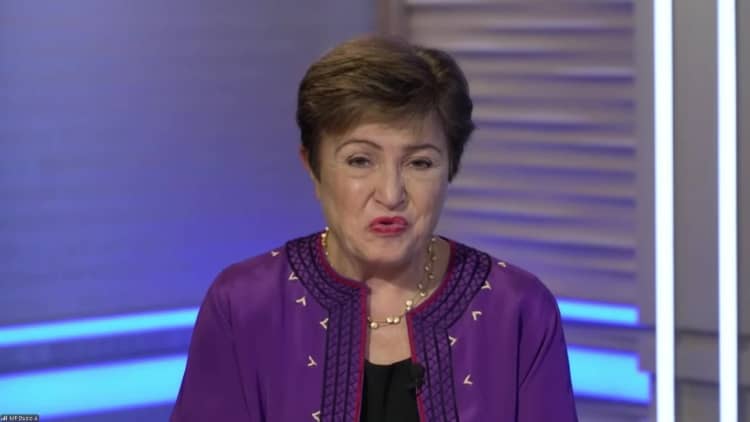[ad_1]
Behold the majestic City of London skyline, where the buildings are tall, and the economic hopes are even taller—at least according to the International Monetary Fund (IMF), which apparently has taken a liking to the color green.
Sopa Images | Lightrocket | Getty Images
In a twist that surprises exactly no one, the IMF raised its 2024 growth outlook for the United Kingdom, predicting that as interest rates and inflation take a leisurely stroll downwards, domestic demand will come out to play. The British economy is now expected to bounce forward like a slightly intoxicated pogo stick with 1.1% growth this year, up from its previous estimate of 0.7%. The agency is clearly optimistic, setting its sights on a 1.5% growth spree for 2025—because who doesn’t love a good, optimistic number to cling to?
In a delightful instance of economic whiplash, the UK’s inflation rate fell to 1.7% in September, down from an impressive 11.1% just a year earlier. Clearly, someone finally got around to turning off the inflation faucet. As services inflation and wages made a bee line for relaxation, economists began whispering sweet nothings about quicker interest rate cuts. The Bank of England might just set its key rate from the dizzying heights of 5.25% down to a cuddly 4.5% by the end of 2024. Oh, to live in a world where economic decisions sound more like a spa day than a finance meeting!
So far, 2023 has seen the UK economy grow at the exhilarating rate of 0.2% in August, staggering forward with all the speed of a molasses-covered tortoise after flatlining in June and July. Truly the stuff of legends.

Meanwhile, the Labour Party is preparing to unveil its budget—its first in what feels like a century—while wearing a brave face. Prime Minister Keir Starmer warns of “tough” decisions needed to close what he claims is a £22 billion ($28.5 billion) funding gap. That’s right, £22 billion, or as I like to call it, a cozy little sum that could buy several small countries—for those feeling particularly generous. His predecessors in the Conservative Party are muttering about that number like it’s the boogeyman after a children’s party.
Starmer has gallantly promised to keep some taxes off the chopping block, specifically for income and corporations. However, your friendly neighborhood taxpayers can expect a delightful smorgasbord of other tax hikes. Uncertainty around this budget is apparently weighing heavily on consumer confidence, but cheer up! The S&P Global UK Consumer Sentiment Index somehow managed to show households feeling a tad more optimistic about their wallets—with some even daring to consider those hefty purchases we all love to regret later.
“It’s great to see the IMF has decided to put on its rose-tinted glasses and upgrade our growth forecast. However, there’s still plenty of ‘hard’ work to be done,” said Finance Minister Rachel Reeves, the new kid on the block. Labour has made it its mission to lead the G7 in the high-stakes game of sustained growth. It’s like a race where no one can agree on the finish line.
In a slightly-less-cheerful note, the IMF has revised its eurozone growth forecast down to 0.8% from 0.9%, claiming the biggest economy—Germany—is as stagnant as a pond in mid-August. Analysts are writing sad poetry about Germany’s competitive struggles in the automobile industry, rising energy prices, and the relentless fog of macro uncertainty, all weighing heavily on production like the world’s most boring backpack.
As we venture through this carnival of so-called “advanced economies,” the IMF is cheerfully bracing itself for a 2.8% expansion in the U.S., a 1.3% bump in Canada, and a pitiful 0.3% in Japan—where high inflation is heckling consumers like an unwanted stand-up comedian at a dinner party.
Source

